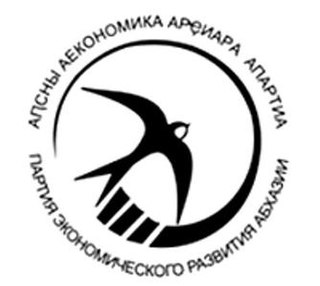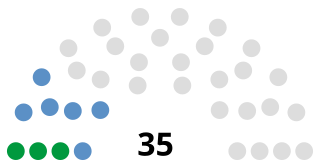
Raul Jumkovich Khajimba is the current President of Abkhazia, having been elected in 2014 after the May Revolution. He was also Chairman of the Forum for the National Unity of Abkhazia from 2010–2015. Khajimba previously held the offices of Vice President (2005–2009), Prime Minister (2003–2004) and Defence Minister (2002–2003). He unsuccessfully ran for President in 2004, 2009 and 2011.
Sergei Shamba is a senior politician from Abkhazia. He is currently a member of the People's Assembly of Abkhazia and Chairman of United Abkhazia. He was Prime Minister of Abkhazia under President Sergei Bagapsh from 13 February 2010 until 27 September 2011. Between 1997 and 2010 he had been Minister for Foreign Affairs under both Bagapsh and his predecessor Vladislav Ardzinba, with only a half-year interruption in 2004. Shamba has twice unsuccessfully participated in Presidential elections, in 2004 and 2011. He has been a staunch proponent for dialogue between Abkhazia and Georgia.
Parliamentary elections were held in Abkhazia on 4 March 2007, with a second round in seventeen constituencies on 18 March.

Gudauta District is a district of Abkhazia, Georgia’s breakaway republic. It corresponds to the eponymous Georgian district. Its capital is Gudauta, the town by the same name. The population of the district was 34,869 at the time of the 2003 census, down from 57,334 in 1989. By the time of the 2011 Census, the population had increased to 36,775.
On 3 October 2004 Abkhazia held its second Presidential elections since the post of President of the Republic of Abkhazia was created in 1994, and the first that were competitive. Election law prohibited incumbent President Vladislav Ardzinba from running for a third term and he instead backed Prime Minister Raul Khadjimba, who also enjoyed support by Russian authorities. Khadjimba's main opponent was Sergei Bagapsh, the candidate supported by the two major opposition parties United Abkhazia and Amtsakhara, and later also by Aitaira when their candidate Alexander Ankvab was barred from running in a controversial decision by the Central Election Commission.

On 12 December 2009, Abkhazia held its fourth Presidential election since the post of President of the Autonomous Republic of Abkhazia was created in 1994. The election was won by incumbent president Sergei Bagapsh in the first round with 61% of the votes, thus gaining a second term in office. He was inaugurated on 12 February 2010. Bagapsh competed against four opposition candidates: former Vice President and Prime Minister Raul Khajimba, who came second behind Bagapsh in the 2004 Presidential election, and newcomers Beslan Butba, Zaur Ardzinba and Vitali Bganba. Khajimba had stated that he, Ardzinba and Butba would support each other should one of them reach the second round of the election.

The Party for the Economic Development of Abkhazia is an opposition party in Abkhazia led by businessman Beslan Butba.
On 12 February 2011, Abkhazia held local elections for the 5th convocations of its local assemblies.

The Government of President Vladislav Ardzinba was the first Government of the Republic of Abkhazia.

A presidential election was held in the Republic of Abkhazia on 26 August 2011. This was the fifth such election since the post of President of the Republic of Abkhazia was created in 1994. The election was held to elect the successor of president Sergei Bagapsh who died in office on 29 May 2011.
The elections for the 5th convocation of the People's Assembly of Abkhazia were held in two rounds on 10 and 24 March 2012.
The 5th convocation of the Sukhumi City Council has been in office since 10 March 2011.
The 5th convocation of the People's Assembly of Abkhazia has been in place since 3 April 2012.
Almasbei Kchach was a former government member and vice-presidential candidate from Abkhazia who committed suicide when investigators came to arrest him in connection with an assassination attempt on President Alexander Ankvab.
Zaur Ardzinba Заур Джотович Ардзинба was a businessman from Abkhazia who unsuccessfully ran for President in the 2009 election.
The Central Election Commission of Abkhazia is the body responsible for conducting national elections and overseeing local elections in Abkhazia. It was first formed on 20 July 1991.
On 3 April 2016, Abkhazia held local elections for the 6th convocations of its local assemblies in all districts except Gali.
The 6th convocation of the Sukhumi City Council has been in office since 13 April 2016.
On 13 March 2004, Abkhazia held local elections for the 3rd convocations of its local assemblies, coinciding with early voting for the Russian presidential election of the following day. On 18 February, the People's Assembly rejected a proposal by President Vladislav Ardzinba to postpone the elections to coincide with the October 2004 presidential election, because all the necessary preparations had already been made.











